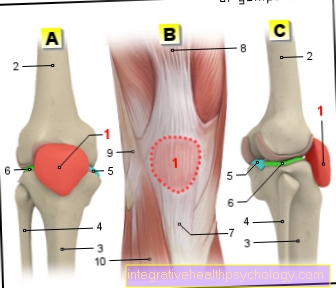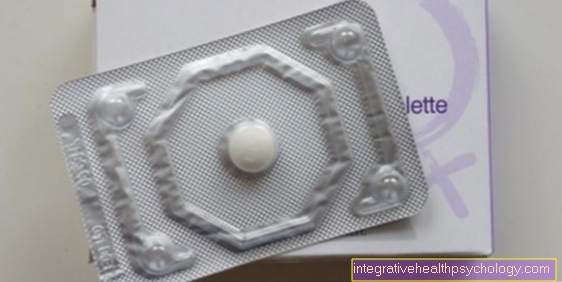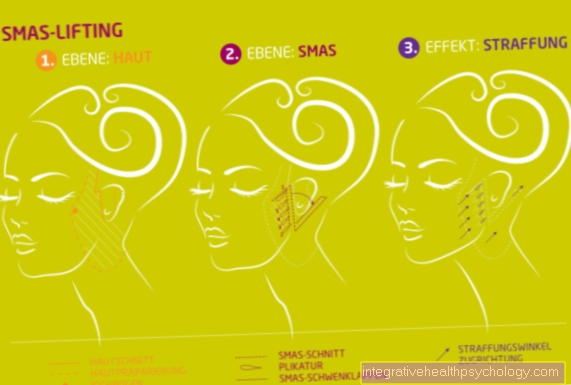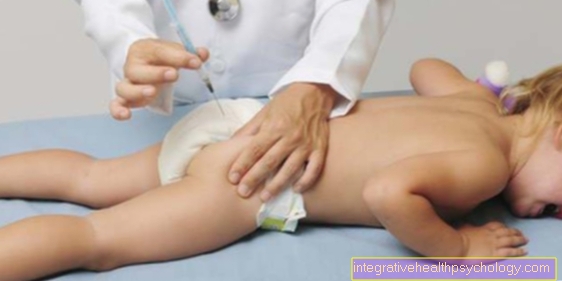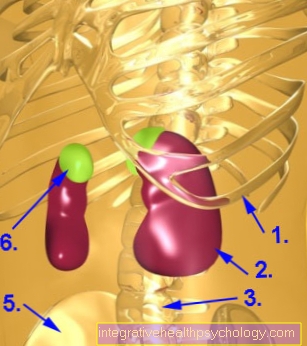Mitral valve prolapse
definition
Mitral valve prolapse is understood to mean a Eversion and a Bulging of the so-called mitral sail in the left atrium. The Mitral valve is one of the four valves of the human heart and is most commonly affected by abnormalities and diseases. Of a Mitral valve prolapse one speaks when the mouth is up bulges more than 2mm into the left atrium. Approx. 2-3% of adults have mitral valve prolapse, but many of them are without symptoms, the diagnosis is usually made by chance and does not require any further treatment.

root cause
The cause of a mitral valve prolapse is largely unknown. A protrusion of the mitral valve comes through a Instability of the threads holding the flap, conditions. It is not known why these threads suddenly lose their stability and traction.
In some cases, which are rather rare, a so-called Marfan's Syndrome lead to the formation of mitral valve prolapse. This is a Connective tissue disease of the whole body, which can lead to instabilities in the heart valve, among other things. Mitral valve prolapse caused by infections such as the bacterial endocarditis (Inflammation of the inner wall of the heart).
Sometimes it can after a heart attack The threads that hold the heart valve in its stable position can tear, which can also lead to acute bulging of the mitral leaflet.
diagnosis
The diagnosis of mitral valve prolapse is usually made by a Ultrasound scan of the heart posed. The procedure, also known as echocardiography, is carried out by a cardiologically specialized internist. During this examination, he can in addition to the Heart wall thickness and the Ejection capacity of the heart also the Position and condition of all four heart valves see and judge. If he has a mitral valve prolapse, he sees one clear bulging of the valve with every heart action. Sometimes a profuse prolapse leads to one decreased closing ability of the valvewhat then one Blood reflux has the consequence. The cardiologist would see this too.
The reason mitral valve prolapse goes undiagnosed for a long time is because it causes it no complaints at first to be triggered. Complaints are only triggered if the protrusion is very pronounced. If the bulging leads to a reduced closing ability of the valve, this valve disease can also be determined by the doctor's auscultation.
Auscultation
This is called auscultation Listening to the lungs and heart by the doctor. Auscultation is a very old diagnostic procedure, but it is still one great diagnostic breadth Has. Especially with auscultation of the heart you can sometimes Smallest valve defects diagnosed at an early stage become. First, the standing or seated patient is monitored at four fixed points above the heart. Each point stands for one of the four heart valves. In the Mitral valve he would at the left chest wall in the upper third put on the stethoscope.
A prolapse of the mitral valve has no effect on the flow properties of the blood for a long time. During this time, auscultation will not produce any abnormal findings. However, if the bulge of the mitral valve enlarges and if it protrudes too far into the left atrium, there will be additional ones Blood turbulence with every heartbeat. Furthermore, a severe prolapse can lead to a complete Incapacity of the mitral valve come what to one Backflow of blood can lead. Both vortices and backflow of blood lead to one additional noisethat the doctor can hear on the left side of the chest wall.
If he notices this heart murmur, he already knows that it is a Mitral valve problem acts. The reliable diagnosis then always takes place by means of an ultrasound examination of the heart, in which, in addition to the type of valve disease, the severity and the influence on the blood flow can be shown.
complaints
For a long time, a bulging of the mitral sail does not cause any discomfort. Especially if the protrusion is not so strong that the blood flow is impaired, the patients usually do not notice the valve damage.
But as soon as that Sails bulged so far is that it is direct reaches into the bloodstream or a firm closure of the valve is no longer possible, there may be strong reflux of the blood, which then leads to a decreased output from the heart leads. Especially with severe mitral valve insufficiency (Inability to lock), which can result from a valve prolapse, it can happen that the heart is not able to eject enough blood. This then has an increasing Undersupply of the body result.
First of all, the heart itself would be undersupplied, which the person affected by a irregular pulse would notice. Also Palpitations or heart failure could be an indication of the severe damage to the valve. Furthermore, the patient would with advanced valve insufficiency also under Circulatory problems, how dizziness suffer and would no longer be able to easily carry out the usual stresses, such as climbing stairs. Also can Rushing ears, shortness of breath and leg edema occurrence.
When a mitral valve prolapse not treated at this stage It can also happen that it becomes severe Heart failure comes. This secondary disease arises because the blood required flows back through the mitral valve, but the heart tries with all its might to eject this blood despite the heart valve not closing properly. Over time the heart enlarges for this reason, to perform the heavy lifting with every pumping. The size of the heart takes on unnatural dimensions what the Heart walls thinner and the Heart weaker can be. Advanced heart failure leads to heart exhaustion, decreased performance, and ultimately death. Heart failure due to valve damage should be avoided in any case, despite the ever-improving medication.
Pain
A mitral valve prolapse is usually only noticed when the severity of the valve defect already causes it Impaired blood flow and cardiac output become. In this case a Variety of symptoms triggered by general physical weakness, up to dizziness and shortness of breath pass.
Heart pain become usually not triggered by mitral valve prolapse. Although uncomfortable stumbling of the heart can be triggered, any pain in the chest or heart area that may arise in this context will come through in most cases resulting muscular spasms conditions. Heart pain, which is caused by an undersupply of the heart due to valve damage, would only arise if the valve insufficiency was so pronounced that even the heart would receive so little oxygen-rich blood and thereby myocardial cells would die.
treatment
Treatment depends on several factors. So the most important decision is whether or not to receive treatment from the Severity of the valve prolapse dependent. In most cases a bulging of the mitral leaflet is discovered only by chance and the actual valve damage does not lead to any discomfort or impairment. In this case, treatment can be dispensed with entirely. Just one regular follow-up should be performed by the cardiologist once a year.
But if the valve damage is so great that it leads to a strong backflow of blood if the patient is impaired, treatment must be given. The Standard treatment of severe mitral valve prolapse is the operative treatment. A heart valve that is so altered that it has a negative effect on the blood flow is a must exchanged become. To Avoiding heart failure there are numerous very well researched today Medication to disposal. However, using the best medication makes no sense if the triggering cause (in this case the heart valve) is not eliminated. So primarily should the Replacement of the flap respectively. Whereas in the past it was necessary to change the valve on a stationary heart and an open chest, cardiac surgery is now so advanced Valve replacement using the keyhole technology and to perform on the beating heart. For the patient, this means a much gentler surgical procedure and faster recovery.
Valve replacement surgery belong to the today Routine interventions in cardiac surgery. There are both mechanical flaps made of special materials as well biological valves of pigs available. Depending on the age and concomitant diseases of the patient, either one or the other valve is chosen. When using mechanical flaps, is a lifelong blood thinning necessary, not with biological valves.
After the surgical replacement, however, the heart should do the best it can protected by medication become. So belong Blood pressure medication, Cholesterol lowering drugs and Beta blockers standard treatment that the patient should take forever. Sports should be carried out to stabilize and increase cardiac output and strength again. Cardio groups are available for this purpose, in which sporting activities can be carried out under medical supervision.
Is Mitral Valve Prolapse Dangerous?
Per se is a mitral valve prolapse not dangerous, since it does not have a dangerous influence on the blood distribution and supply in the body for a long time. The greatest danger recruits untreated and worsening mitral valve prolapse Because if this valve damage is not treated, there is a risk of increasing Heart failure (Heart failure). This should be prevented in any case, as it is still a serious and dangerous clinical picture today. Heart failure can also be reduced by medication, but the patient will never have a healthy heart afterwards. A severe heart failure with enlarged heart and exhaustion put one life-threatening condition that can also be fatal.
Exercise for mitral valve prolapse
Depending on the extent and severity of the valve prolapse and possibly accompanying heart failure Sport recommended become. Numerous factors must be considered in order for the doctor to make this recommendation. At a mild mitral valve prolapse without accompanying symptoms and without heart failure, sports can be done.
At incipient heart failure through an untreated mitral valve prolapse should Avoid excessive sporting activitiesso as not to weaken the heart too much. First, the cause of the heart failure should be eliminated.
After a valve replacement can in severe heart failure under medical supervision E.g. in a cardio sports group the heart can be slowly re-trained. The strict bed rest for heart failure, which was still common in the past, has now been abandoned, as we now know that moderate and constant stress on the heart can improve heart failure.
pregnancy
Mitra valve prolapse in a pregnant woman occurs very rarely and has to be treated much less often. The rarity can be explained by the fact that older people in particular are affected by valve damage. In young people, mitral valve prolapse can be the result of an inflammation of the inner wall of the heart or myocarditis. If this valve damage is found out during pregnancy, it should initially a conservative approach should be chosen, since surgical treatment should be prevented by all means during pregnancy so as not to endanger the unborn child.If, in very rare cases, a mitral valve prolapse is so severe that it Effects on the bloodstream has, should If possible, surgical treatment should be waited until after the birth. Conservative treatment (blood pressure adjustment) can be carried out after weighing the risks and benefits.
Endocarditis prophylaxis
Endocarditis prophylaxis is one antibiotic cover for minor surgical interventions, such as. pulling teeth. This is intended for heart-damaged patients Prevents the development of a dangerous inner wall inflammation become. In the past, the need for such an antibiotic cover was taken much broader. However, data showed the easing of the need.
Patients with mitral valve prolapse do not need endocarditis prophylaxis, but patients with a valve replacement. Prophylaxis takes place approx. 30-60 minutes before a surgical procedure by administering the antibiotic Amoxicillin.
















